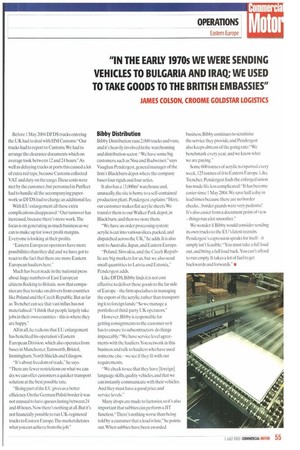"IN THE EARLY 1970s WE WERE SENDING VEHICLES TO BULGARIA
Page 61

If you've noticed an error in this article please click here to report it so we can fix it.
AND IRAQ; WE USED TO TAKE GOODS TO THE BRITISH EMBASSIES"
JAMES COLSON, CROOME GOLDSTAR LOGISTICS
Before 1 May 2004 DFDS trucks entering the UK had to deal with HM Customs:"Our trucks had to report to Customs. We had to arrange the clearance documents which on average took between 12 and 24 hours."As well as delaying trucks at ports this caused a lot of extra red tape, because Customs collected VAT and duty on the cargo.These costs were met by the customer, but personnel in Purfleet had to handle all the accompanying paperwork so DFDS had to charge an additional fee.
With EU enlargement all these extra complications disappeared:-Our turnover has increased, because there's more work.The focus is on generating as much business as we can to make up for lower profit margins. Everyone is looking at their profits.
"Eastern European operators have more possibilities than they did; and we have got to react to the fact that there are more Eastern European hauliers here."
Much has been made in the national press about huge numbers of East European citizens flocking to Britain. now that companies are free to take on drivers from countries like Poland and the Czech Republic. But as far as Trencher can see that vast influx has not materialised:"1 think that people largely take jobs in their own countries this is where they are happy" All in all, he reckons that EU enlargement has benefited his operation's Eastern European Division, which also operates from bases in Manchester,Tamworth,Bristol, Immingham, North Shields and Glasgow.
"It's about freedom of trade," he says. "There are fewer restrictions on what we can do; we can offer customers a quicker transport solution at the best possible rate.
"Being part of the EU gives us a better efficiency On the German/Polish border it was not unusual to have queues lasting between 24 and 48 hours. Now there's nothing at all. But it's not financially possible to run UK-registered trucks to Eastern Europe. The market dictates what you can achieve from the job."
Bibby Distribution
Bibby Distribution runs 2,000 trucks and vans, and it's heavily involved in the warehousing and distribution sector.' We have some big customers, such as Nisa and Budweiser.says Vaughan Pendergest, general manager of the firm's Blackburn depot where the company bases four rigids and four artics.
It also has a 13,000m2 warehouse and, unusually, the site is home to a self-contained production plant. Pendergest explains:"Here, our customer makes flat acrylic sheets.We transfer them to our Walker Park depot, in Blackburn, and then we store them.
"We have an order processing system: acrylic is cut into various slices, packed, and dispatched across the UK," he adds. It is also sent to Australia. Japan, and Eastern Europe.
-Poland, Slovakia, and the Czech Republic are big markets for us, but we also send small quantities to Latvia and Estonia," Pendergest adds.
Like DEDS,Bibby finds it is not cost effective to deliver these goods to the far side of Europe the firm specialises in managing the export of the acrylic, rather than transporting it to foreign lands: "So we manage a portfolio of third-party UK operators," However. Bibby is responsible for getting consignments to the customer so it has to ensure its subcontractors do things impeccably: -We have service level agreements with the hauliers. You network in this business and talk to hauliers who have used someone else -we see if they fit with our requirements.
"We check to see that they have [foreign] language skills, quality vehicles, and that we can instantly communicate with their vehicles. And they must have a good price and service levels."
Many drops are made to factories, so it's also important that subbies can perform a _TIT function. "There's nothing worse than being told by a customer that a load is late," he points out.When subbies have been awarded business, Bibby continues to scrutinise the service they provide, and Pendergest also keeps abreast of the going rate: "We benchmark every year, and we know what we are paying."
Some 600 tonnes of acrylic is exported every week. 125 tonnes of it to Eastern Europe. Like Trencher, Pendergest finds the enlarged union has made life less complicated: "It has become easier since I May 2004. We save half a day in lead times because there are no border checks... border guards were very pedantic! It's also easier from a document point of view things run a lot smoother."
We wonder if Bibby would consider sending its own trucks to the EU's latest recruits. Pendergest's expression speaks for itselfit simply isn't feasible:"You must take a full load out, and bring a full load back. You can't afford to run empty. It takes a lot of fuel to get backwards and forwards." •










































































































































































































